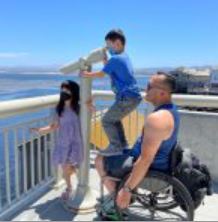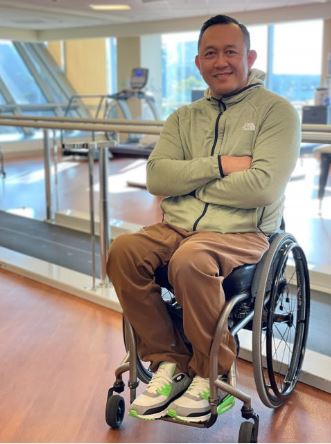By Anita Creamer, Vitals contributor
Steve Lau is a medical social worker in Alta Bates Summit Medical Center’s acute rehab services unit. Twenty years ago, when he was 21, an accidental fall caused a complete spinal cord injury to his T7 and T8 vertebrae, leaving him paralyzed from the chest down. Here, in his own words, he talks about his life and work.
Earlier this year, I had my 20th rebirth anniversary. The spinal cord injury is the beginning of your new life.
I was with friends cruising around with our car club, and we stopped at Pescadero, Calif., for lunch. We were parked on a bridge over a dry creek bed. I fell 30 to 40 feet.
I’d had lifeguard training, and I knew I was paralyzed right away. From the chest down, I have no mobility or sensation, but I have full upper body strength. I was really lucky to have that. When I was in the hospital, I shared an ICU room with a quadriplegic. That gave me a different perspective.

Steve Lau with twins Elliot and Evelyn
Before the injury, I thought I’d become a firefighter or join the military. But the spinal cord injury changed everything.
The path to helping others
I started playing adaptive sports—wheelchair basketball. I was less than five years post-injury. In 2006, I met my future wife, and I married her in 2007. Today we have twins, who are almost 7.
At the time, my teammates would ask how I was doing this and that in regard to bowel and bladder program, how I found my wife, even intimate questions like sex and fertility. In a sense, I was already doing social work and helping them impact their quality of life.
In 2002, I did my spinal cord injury rehab at Alta Bates Acute Rehab at Herrick. This unit has since moved to Alta Bates Summit Medical Center in Oakland. Today, I’m lucky to be one of the clinical social workers for two of the teams that specialize in spinal cord injuries, both traumatic and non-traumatic. Now I help impact my patients’ lives through my personal experiences.
As a patient, I was hesitant to believe what the doctors or therapists would say, because they were ambulatory. When my patients see me roll into their rooms in a wheelchair, they’re like, “You’re like me.”
They trust my judgment because I’m living through it, as well. They want to know about education and adjustment and sex and working and finding a partner. There are a lot of self-esteem issues involving disabilities and spinal cord injuries. In some situations, it’s a lot easier to be educated about these topics from me than from the doctor, therapists or neuropsychologists.
What he wants people to know
When other people say I’m an inspiration—I don’t feel like I’m an inspiration. I’m just living my life. I’m doing what I need to do, but I’m moving in a different way and using a wheelchair. I’m trying to be productive, I’m trying to be a husband and a father. At work, I’m trying to help my patients improve their quality of life.
When patients say that I’m an inspiration, it’s different. That means that I may have affected them in some way, so that they can continue to live their lives to their highest potential.
National Disability Employment Awareness Month (NDEAM) is recognized each October. The observance celebrates the contributions of America’s workers with disabilities past and present, and showcases supportive, inclusive employment policies and practices.





